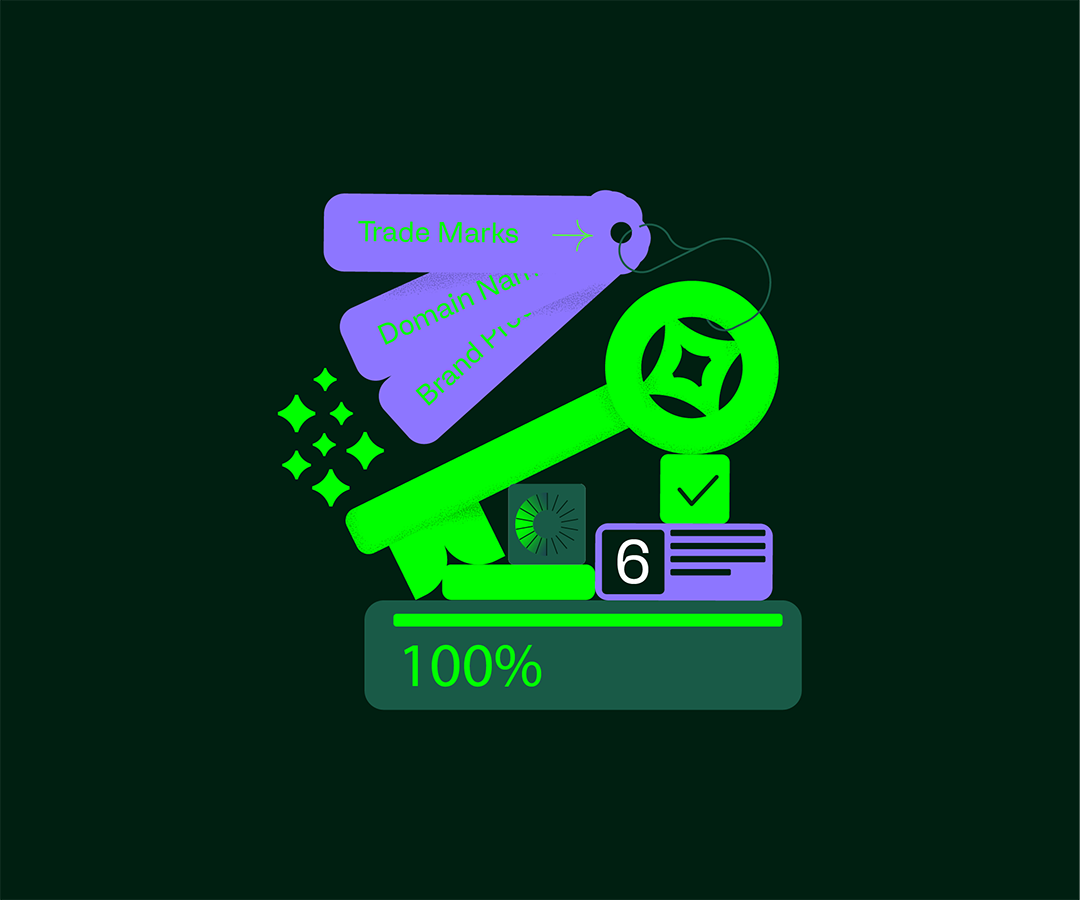
Register Trade Mark
Registering your trade mark can be a complicated process with plenty of legal pitfalls. Our experts have managed 1000's of trade marks, and will take care of the entire process. Fill in our form, and you will be on the path to a more protected future, free from concerns!
All expertise in-house
Abion's one point of contact provides you experts with extensive experience in intellectual property law, who work closely with our colleagues in the IT and Domain departments.
Pro-active Monitoring
When you have your brand portfolio with us, you ensure secure management and guaranteed renewal of your trade marks. At the same time, we can closely monitor and enforce your IP in case of infringement.

Abion Core
On our platform, you have a clear overview of your IP assets, a high level of security, and automated management of all global top-level domains.
Protect Your Trade Marks With Us
When you register a trade mark with us, our legal team works with you to align protection with your business goals today and tomorrow. Once applications are secured, we help safeguard your intellectual property from infringement and threats. Our experts will:
- Plan a strategic trade mark registration
- Assess potential IP and market risks
- Ensure you have the rights needed in key markets
- Monitor and enforce your trade marks
- Provide access to Abion Core for full transparency and control

UK
From £ 850 / € 995
EU
From £ 1.250 / € 1,465
US
From £ 1.820 / € 2,130
Sweden
From £ 640 / € 750
From dream to reality
A company's success relies heavily on its brand reputation and goodwill. Substantial investments and marketing efforts are dedicated each year to enhancing brand awareness. However, due to a lack of understanding and/or legal expertise, brands, particularly start ups, are often left with inadequate protection that leaves them vulnerable to abuse or limited in terms of growth and enforcing their IP rights.
Registering a trade mark not only opens up new opportunities but also secures your exclusive rights to use it. Therefore, it is crucial to complete applications accurately and strategically.

The Power of Exclusive Rights
Registering a trade mark secures your exclusive rights and opens opportunities for growth. Exclusive rights are the foundation of a strong brand: without them, competitors can use similar marks, creating confusion in the market. In today’s digital world, your trade mark must be unique, strong, and memorable — and accurate, strategic registration is key.
What Can Be Registered?
Trade marks aren’t limited to just names and logos. Depending on jurisdiction, you may also be able to register:
Word marks
Brand names, slogans.
Logos
Figurative marks.
Sounds
Jingles, audio logos.
Smells
Rare, but possible in some countries.
3D Shapes
Distinctive product or packaging forms.
Holograms
Dynamic, multi-dimensional signs.
Colours
Specific brand-identifying colours or combinations.
Patterns
Repeating motifs that identify a brand.
Register a trade mark now
We'll handle the whole process, so your trade mark will be safely protected!
From local to international markets
Trademark registration should be secured in all markets where you conduct any form of business, whether it's production, marketing, sales, or a combination of these activities. While some companies may find registration in their domestic market, such as Swedish, sufficient, others may require protection across the entire EU or internationally.
Wherever in the world you would like to register and protect your trade mark(s), Abion is able to assist. With our extensive experience in trade mark registration, monitoring and enforcement, we are able to manage your trade mark portfolio in a comprehensive, cost-effective, and streamlined way, from start to finish. Don't hesitate to fill in the form, if you want to find out more about registering a trade mark with Abion.
A registration is usually valid for 10 years
Trademark registration, usually valid for 10 years, is a cost-effective way to protect one of your company's most valuable assets. With this in mind, it is important to think broadly: anything that defines your business, product, service, or story should be protected. Our legal experts are able to support you in developing a strategy to enhance your brand identity internally and externally, ensuring you are covered in the relevant classes, markets and systems. Our automated processes also mean renewals are never missed and the longevity of your brand is secured.
The Process of Registering a Trade mark
Registering a trade mark is a critical step in protecting your brand identity and securing your intellectual property rights. Here’s a detailed outline of the process involved:
FAQ about registering a trade mark
If someone infringes on your registered trade mark, you have several options to address the situation:
-
Cease and Desist Letter
Send a formal notice to the infringer, demanding that they stop using your trade mark. Often the first step, this letter serves as a warning and can sometimes resolve the issue without further legal action. -
Negotiation and Settlement
Engage in direct negotiations with the infringer to reach a mutually agreeable solution. This can lead to a settlement that might include payment for damages, an agreement to stop using the mark, or a licensing arrangement. -
Administrative Action
File a complaint with the trade mark office or relevant authority in the jurisdiction where the infringement is occurring. The office may take administrative actions such as cancelling the infringer’s registration or preventing their use of the mark. -
Litigation
File a lawsuit in civil court against the infringer. Seek legal remedies such as an injunction to stop the infringing use, monetary damages, and potentially the recovery of attorney's fees. -
Customs Enforcement
Register your trade mark with customs authorities. Customs can help block the import and export of counterfeit goods bearing your trade mark. -
Alternative Dispute Resolution (ADR)
Utilise mediation or arbitration to resolve the dispute. These methods can be less costly and quicker than litigation.
Having a professional trade mark attorney on your side for any infringement actions is highly recommended.
Abion offers comprehensive trade mark registration services, guiding you through the process from start to finish to ensure your brand is legally protected on a global scale. Our expert team of trade mark professionals is dedicated to safeguarding your brand with passion and dedication.
The process of trade mark registration is a multifaceted and involved process that can vary depending on a variety of factors, including the country in which you are seeking protection, the complexity of the trade mark, and the number of applications currently being processed. Typically, the trade mark registration process involves a variety of stages, including an initial search to ensure the trade mark is not already protected, drafting and filing the application, examination by the trade mark office, publication, and, if no oppositions are filed, registration.
The duration of the process can also vary based on these same factors, with some countries experiencing longer wait times due to high volume or more extensive approval processes. On average, the process can take several months to a year or more, depending on the country and circumstances involved to secure your exclusive rights.
The main difference between the registered trade mark symbol (®) and the trade mark symbol (™) lies in legal protection. The trade mark symbol (™) is typically used to indicate that a brand name, logo, slogan, or other trade marked element is being used as an identifier for goods or services. It shows that the owner of the trade mark is claiming ownership of the brand identity, but it doesn't necessarily mean that the trade mark has been officially registered with a government agency.
On the other hand, the registered trade mark symbol (®) is used to indicate that a trade mark has been officially registered with the appropriate government agency. It provides additional legal protection and enables the owner to take legal action against anyone who attempts to use or imitate the trade mark without permission.
It's important to note that using the registered trade mark symbol (®) without having a registered trade mark can be illegal and subject to penalties. Therefore, it's crucial to ensure that your trade mark is officially registered before using the symbol.
It depends on where you would like to register it. Within the EU it costs from € 1.450, within UK from € 1.140, within US from € 2.110 and within Sweden from € 740. The final price depends on whether you require more than one trademark, and more than one trademark class.
Registering a trade mark can be a complex and nuanced process, involving legal terms, documentation requirements, and potential pitfalls. While it is possible to proceed without professional assistance, hiring a trade mark attorney can offer various advantages and increase your chances of a successful registration.
A trade mark attorney can conduct a comprehensive search to identify potential conflicts with existing trade mark, ensuring that your application has a higher chance of being accepted. They can also provide strategic advice on trade mark selection, helping you choose distinctive and protectable marks that align with your brand's long-term objectives. The legal aspects of intellectual property can be complex and a small error can weaken your trademark protection, and lead to legal action against you.
Furthermore, a trade mark attorney acts as your advocate throughout the application process. They can respond to any official actions or objections from trade mark examiners, handle communication with trade mark offices, and provide guidance on potential oppositions from other trade mark owners. Their expertise can help navigate any legal complexities and ensure a smoother path to registration.
Ultimately, while hiring a professional is not required by law, it is highly recommended to consult a trade mark attorney to maximise your chances of a successful trade mark registration. They can provide invaluable guidance and support, helping you protect your brand effectively and avoid potential setbacks. At Abion, we have a team of experienced trade mark attorneys who can assist you at every step of the registration process, ensuring your trade marks are handled with precision and care.
Trade marks encompass a wide spectrum of brand elements, such as words, product name, logos, symbols, slogans, and even sounds or colours, all of which play a crucial role in uniquely identifying your brand in the marketplace. These intellectual property elements are the building blocks of your brand's visual and auditory identity, serving to distinguish your products or services from those of competitors. By registering these trade marks, you gain exclusive rights to use and protect these brand identifiers, establishing a strong and recognisable presence in the market.
Yes, there are three main options for registering a trade mark internationally:
Madrid System
What Is It: A centralised system managed by the World Intellectual Property Organization (WIPO).
How It Works: File a single application through your home country's trade mark office to seek protection in multiple member countries.
Benefits: Simplifies and reduces the cost of international trade mark registration and management.
Direct National Applications
What Is It: Filing individual trade mark applications directly in each country where protection is sought.
How It Works: Submit separate applications to the trade mark offices of each desired country.
Benefits: May be necessary if key markets are not part of the Madrid System or if specific legal strategies are required.
Regional Systems
What Are They: Systems that allow for trade mark registration across multiple countries within a specific region.
Benefits: Efficient for obtaining regional protection with one application.
Examples:
- European Union Intellectual Property Office (EUIPO)
- African Intellectual Property Organization (OAPI)
- Benelux Office for Intellectual Property (BOIP)
- Eurasian Patent Organization (EAPO)
- Gulf Cooperation Council (GCC)
Each option has its own advantages and is suitable depending on your business's specific needs and the markets you are targeting.
Registering a trade mark is essential as it serves as a shield, safeguarding your brand's identity from misuse by others. By obtaining trade mark protection, you gain the exclusive rights to utilise the mark for your unique products or services, ensuring that your brand remains distinct and secure in the marketplace. This legal protection not only strengthens the integrity of your brand but also provides you with the right to protect it should infringement occur. The holder of an exclusive right can be both an individual or a corporation.
Glossary of Trade mark Terms
Abandonment
The loss of rights in a trade mark due to non-use or failure to maintain the trademark, such as by not renewing it or using it improperly.
Cease and Desist Letter
A document sent to an individual or business to halt purportedly unlawful activity (“cease”) and not to restart it (“desist”).
Certification Mark
A mark used to show consumers that particular goods or services, or their providers, have met certain standards.
Collective Mark
A trademark used by members of a cooperative, association, or other collective group or organisation.
Descriptive Mark
A mark that describes a characteristic or quality of the goods or services and can only be registered if it has acquired distinctiveness.
Dilution
Weakening of a famous mark’s ability to identify and distinguish goods or services, even without showing consumer confusion or competition.
Distinctiveness
The uniqueness of a trade mark, which determines its strength and protectability. Marks can be inherently distinctive (fanciful, arbitrary, or suggestive) or acquire distinctiveness through use (descriptive).
EUIPO
European Union Intellectual Property Office, responsible for managing the EU trade mark and the registered Community design.
Generic Mark
A mark that is common to a particular class of goods or services and cannot be registered as it lacks distinctiveness (e.g., "Bicycle" for a bicycle brand).
Infringement
Unauthorised use of a trade mark or service mark on competing or related goods and services. This use may cause confusion, deception, or a misunderstanding about the true origin of the goods or services.
Intent to Use
A declaration made by an applicant stating their intention to use the trade mark in commerce in the future.
Madrid System
An international system that allows a trademark owner to seek protection for their mark in multiple countries through a single application.
Mark
Includes all different types and is often used in short.
Nice Classification
An international system used to classify goods and services for the purpose of registering trade marks.
Office Action
A document written by an examiner in a trademark office, explaining why a trade mark application is deficient and what corrective actions are needed.
Official emblems
Icons that can be placed next to items that are protected by trade mark law. Some examples of official emblems are ™️ | ©️ | ®️
Opposition
A proceeding in which one party seeks to prevent the registration of another party’s trade mark, usually on the grounds that the trademark is too similar to their own.
Principal Register
The primary register of trade marks maintained by the USPTO, providing full trade mark protection.
Service Mark
Similar to a trade mark, but identifies and distinguishes the source of a service rather than a product.
Specimen
A sample of how the trade mark is actually used in commerce, required for the application process.
Supplemental Register
A secondary register of trade marks maintained by the USPTO, offering limited protection for marks that do not qualify for the Principal Register but are capable of distinguishing the applicant’s goods or services.
Trade Dress
The visual appearance of a product or its packaging that signifies the source of the product to consumers.
Trade mark
A symbol, word, or words legally registered or established by use as representing a company or product.
Trademark Electronic Search System (TESS)
An online database provided by the USPTO that allows users to search for existing trade marks.
USPTO
United States Patent and Trademark Office, the federal agency for granting U.S. patents and registering trade marks.



